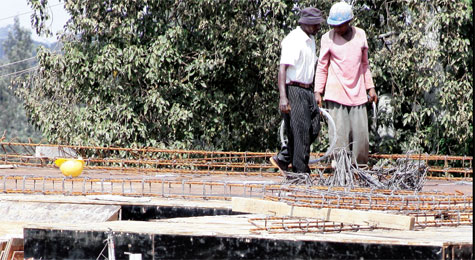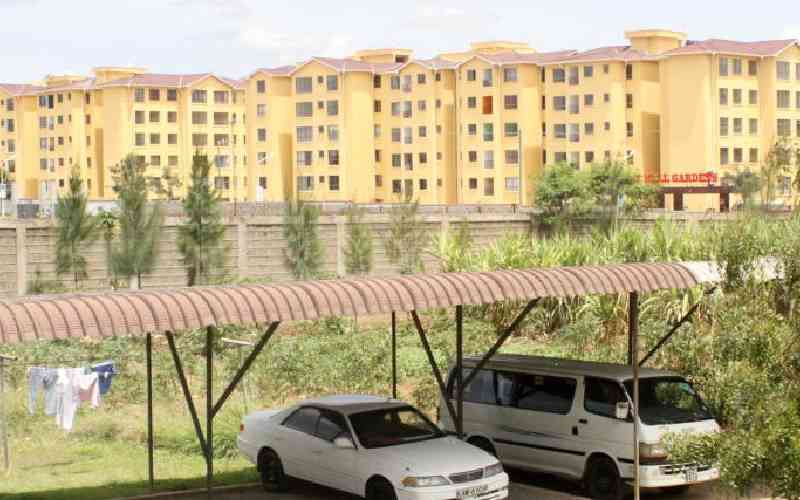 |
|
Construction workers at a site. |
The era of unqualified contractors, uncontrolled and unregulated constructions are set to come to an end with the establishment of the National Construction Authority, writes ALLAN OLINGO
The National Construction Authority (NCA), launched last week, plans to start its operation by creating awareness to all stakeholders on its mandate in the construction industry.
The authority is mandated to scrutinise the contractors’ list of registration from the Ministry of Public Works to weed out contractors who are not properly registered. It is also mandated to monitor the construction process, including private properties as detailed in the Physical Planning Act currently being implemented by the local authorities.
According to the chairman of the authority’s board, Ken Onditi, the authority will strictly enforce the existing laws to bring sanity to the sector.
“Anybody who wants to build must come to the National Construction Authority offices, and get the authority’s clearance certificate; without the certificate, you will not build,” warns Onditi.
The authority will be in charge of registering all contractors after thorough scrutiny to ensure they have the required capacity to carry out any construction, both in private and public projects.
Said Onditi: “We will import the list of registration from the Ministry of Public Works, and we will scrutinise the people who are not registered properly, because we realise that this is what is causing a lot of buildings to collapse in Kenya.”
capacity appraisaL
Onditi says the authority will not only regulate contractors, but also monitor projects being carried out by various government institutions to ensure there is no misuse of funds.
Architectural Association of Kenya Chairman Stephen Oundo says the authority is now expected to weed out quacks and put an end to shoddy works and curb collapsing building accidents in a sector that has remained unregulated since 1986 when Parliament disbanded the National Construction Corporation.
Oundo says the key thing to be observed by the authority will be the capacity of any contractor, including professional qualification, staff capacity and financial capability, especially those dealing with government projects.
“This will do away with contractors who have been doing shoddy jobs and led to the collapse of buildings because they use sub standard procedures that compromise the industry,” says Oundo.
So far there are over 6,000 contractors in Kenya, a number, that the Ministry of Public Works Permanent Secretary John Lonyangapuo says might greatly reduce due to the authority’s mandate.
“It will be a thing of the past for you to come running with your money pretending to be a contractor. Everybody has to abide with the changes,” Lonyangapuo says.
Other duties to be addressed by the authority include advising the government on the funding of various government projects; develop and publish a code of conduct for the construction industry; and certify skilled construction workers among other duties.
Stay informed. Subscribe to our newsletter
Collins Otieno, a real estate consultant and valuer at Pam Golding Properties Kenya, highly welcomes the introduction of the National Construction Authority because it will greatly streamline the construction industry.
“Just to demonstrate how important the authority is, we should first know that every facility goes through a lifecycle of planning, designing, construction, operations and maintenance, and decommissioning,” says Otieno.? “Facilities include buildings, highways and roads, network infrastructure such as telecommunications, power, water, wastewater and gas networks.”
monitoring and evaluation
The Authority must have an input by monitoring each of these processes so that Kenya will succeed in having a quality-driven indigenous construction industry.
According to Oundo, the fact that the authority is composed of members drawn from the relevant professions in the private and public sector is a plus, and will without doubt motivate new approaches to how buildings are designed, built, operated and maintained.
Oundo notes that the professionals in the NCA will put in stringent measures to curb the flooding of the industry with unqualified and poorly trained manpower.
Another important aspect the NCA will address, though indirectly, is the construction materials— their availability in local markets, their production at local level, and their quality and its control.
Says Otieno: “Many building materials such as cement and steel are bulky, and their price is sensitive to both the scale of production and transportation costs. We are lucky to have local products of the same.”
However, players in the industry maintain that the NCA should also regulate the quality of the products, and look at ways of cutting costs to stave off the importation of cheaper and less durable materials.
How does all this help the country?
While the construction industry’s contribution to the national development is significant, it also stimulates a sizeable amount of economic growth through back and forward linkages.
IMMENSE CONTRIBUTION
Says Otieno: “Indeed, and in my opinion, the construction of physical facilities make up more than a half of the gross domestic investment in Kenya. In such a situation, what we need is a strong regulator— and the National Construction Authority will hopefully be that.”
Like every regulator, the authority will face some major challenges. According to Oundo, non-cooperation by entities that have always exploited loopholes in the current framework for economic gain might be a challenge the authority will have to deal with.
Another foreseen challenge is that the mechanism for enforcing regulations, is still very poor- either due to lack of goodwill by enforcers or inadequacy of knowledge.
“Even if they have means to enforce their regulations their punishments are deemed light and non-deterrent with a contractor paying a meagre sum of Sh10, 000, jailed for one year or both. This is little,” says Otieno.
It is also important to note that disciplines such as architecture, valuation, quantity surveying, structural engineering, construction, civil engineering are classic information silos and these islands of information and technology will make it very difficult for the authority to integrate existing data in a seamless manner.
The authority consists of 18 members drawn from both the private and public sector, including the ministries of Finance, Housing, Local Government, and the Roads . Others include the Architectural Association of Kenya, Institute of Quantity Surveyors of Kenya, Law Society of Kenya and the Institution of Engineers of Kenya.
 The Standard Group Plc is a
multi-media organization with investments in media platforms spanning newspaper
print operations, television, radio broadcasting, digital and online services. The
Standard Group is recognized as a leading multi-media house in Kenya with a key
influence in matters of national and international interest.
The Standard Group Plc is a
multi-media organization with investments in media platforms spanning newspaper
print operations, television, radio broadcasting, digital and online services. The
Standard Group is recognized as a leading multi-media house in Kenya with a key
influence in matters of national and international interest.
 The Standard Group Plc is a
multi-media organization with investments in media platforms spanning newspaper
print operations, television, radio broadcasting, digital and online services. The
Standard Group is recognized as a leading multi-media house in Kenya with a key
influence in matters of national and international interest.
The Standard Group Plc is a
multi-media organization with investments in media platforms spanning newspaper
print operations, television, radio broadcasting, digital and online services. The
Standard Group is recognized as a leading multi-media house in Kenya with a key
influence in matters of national and international interest.









